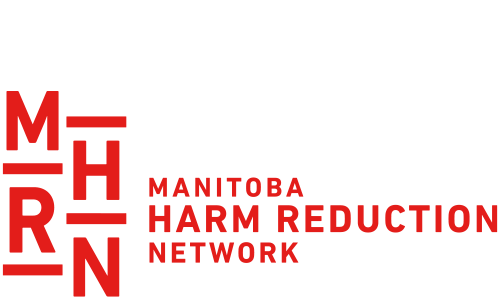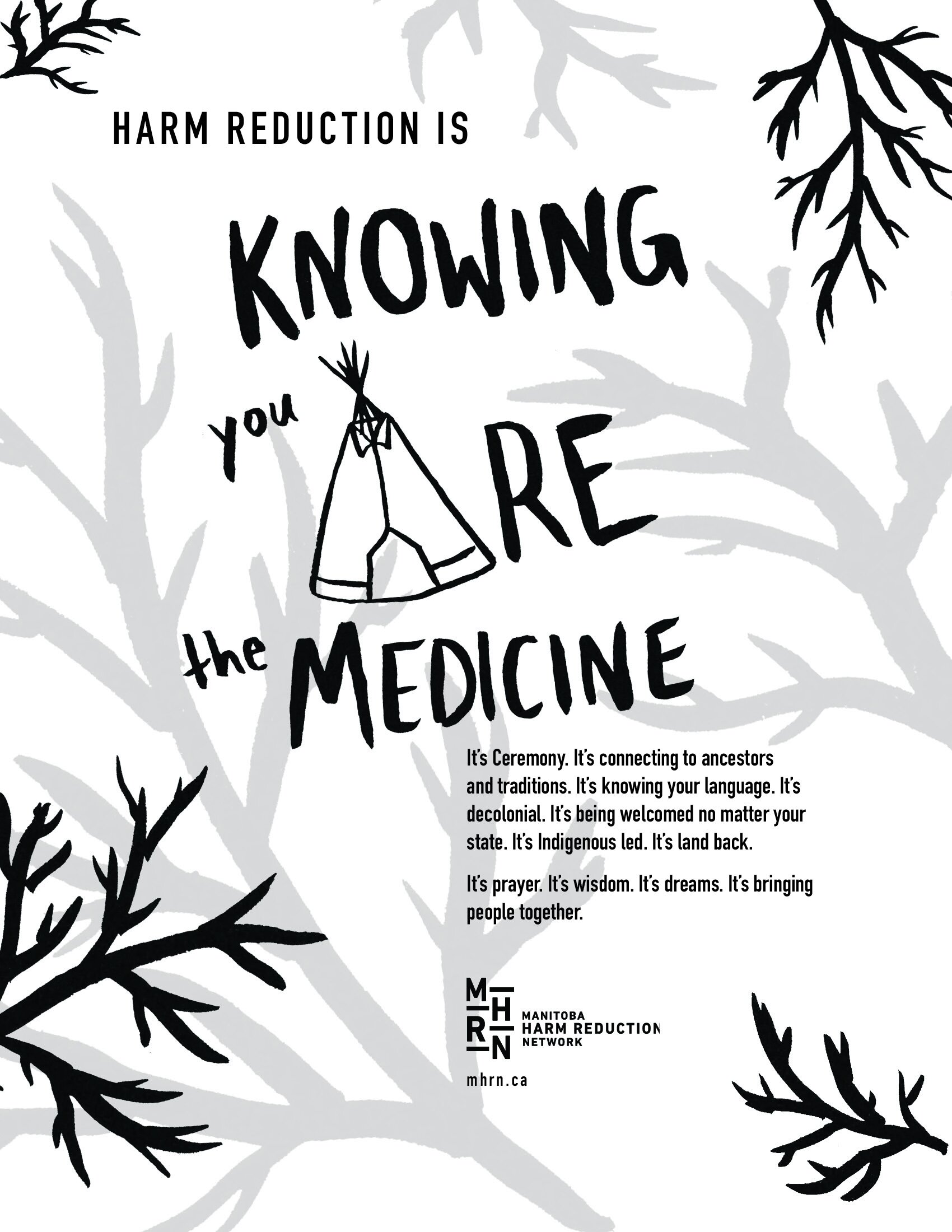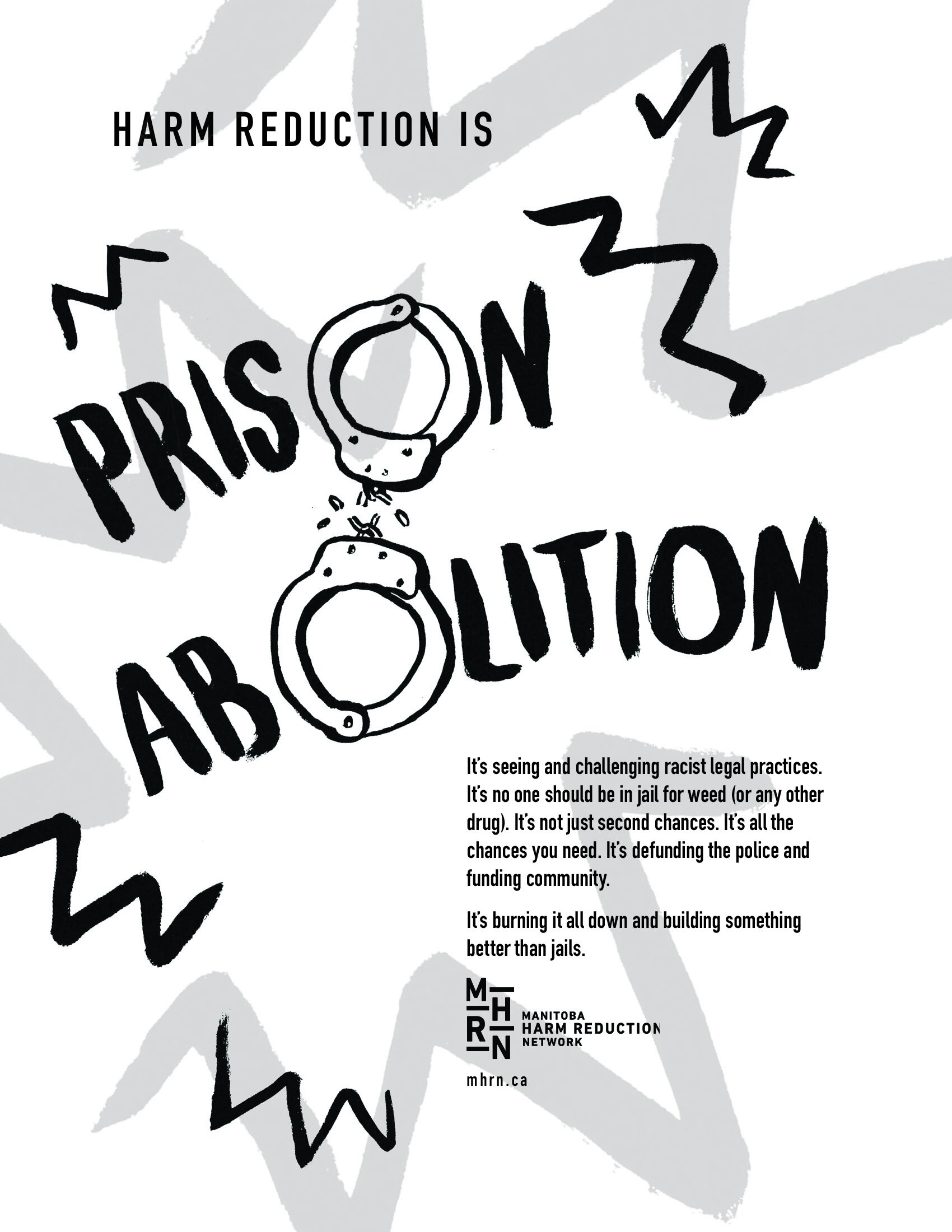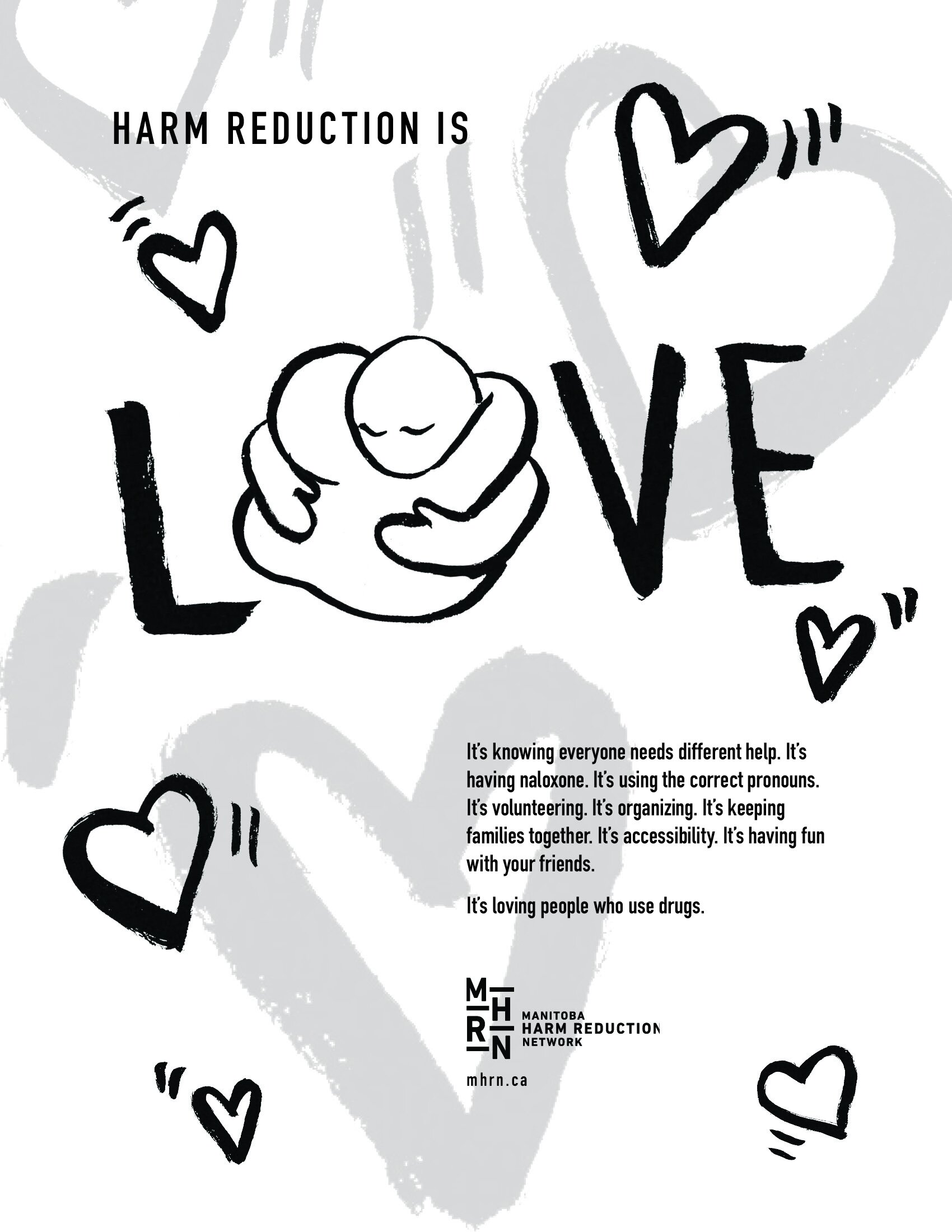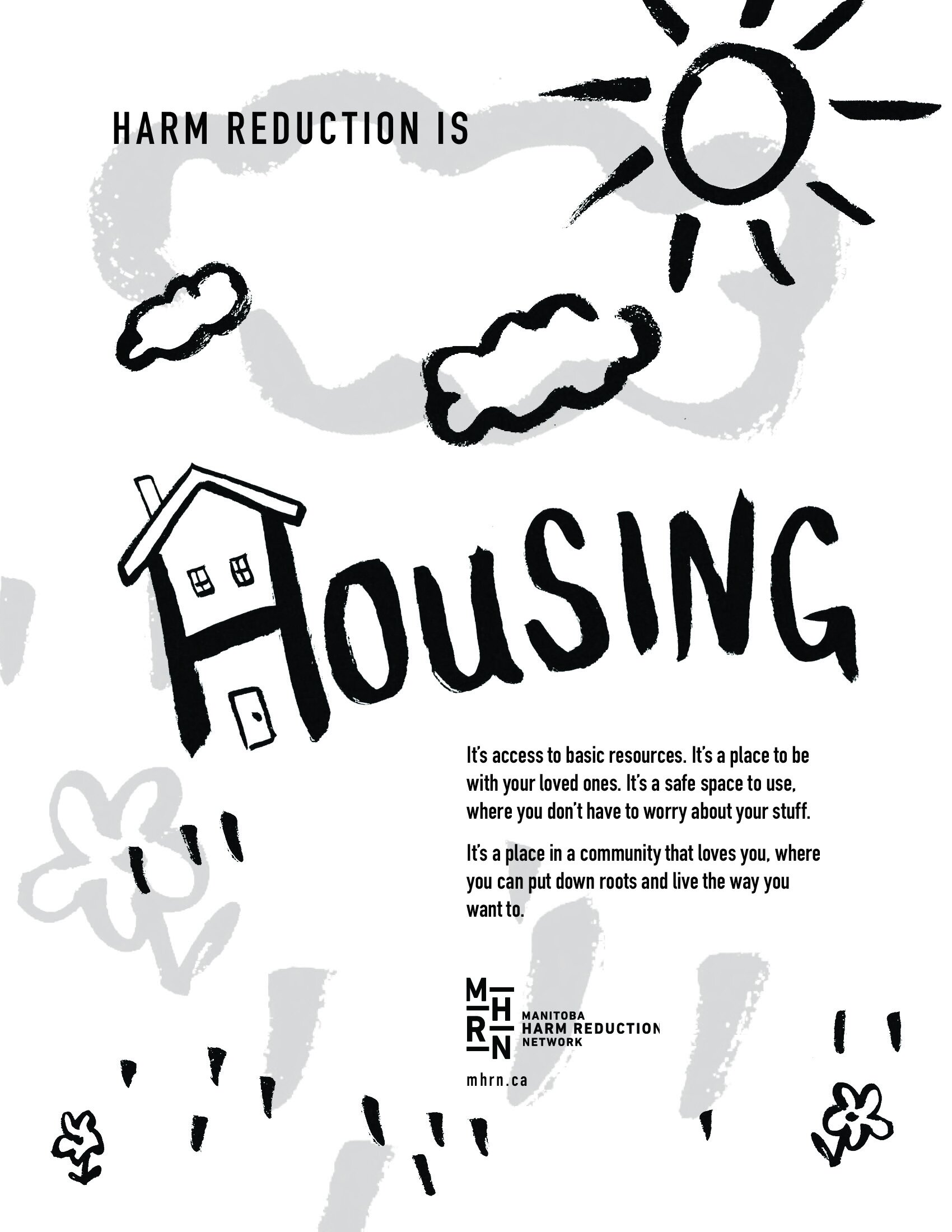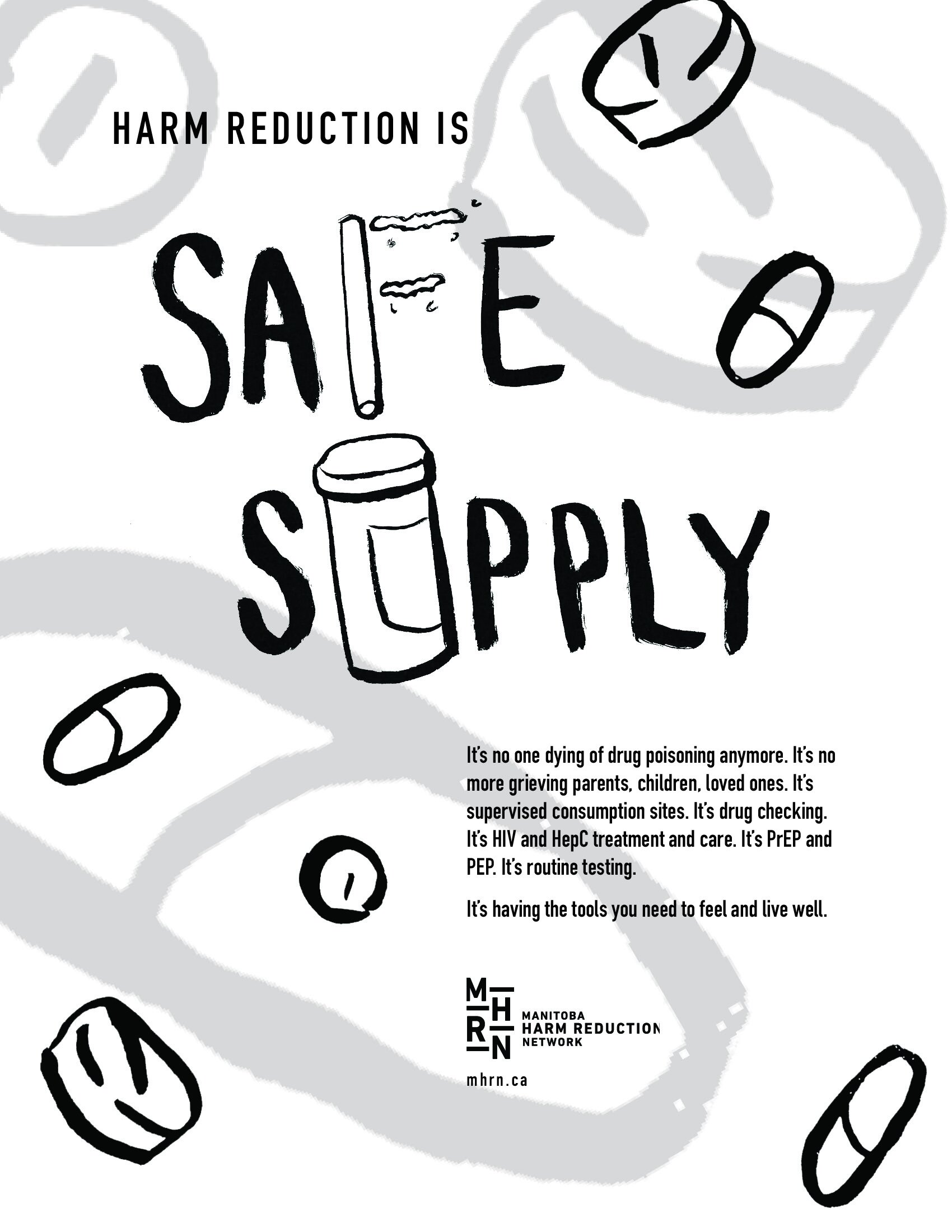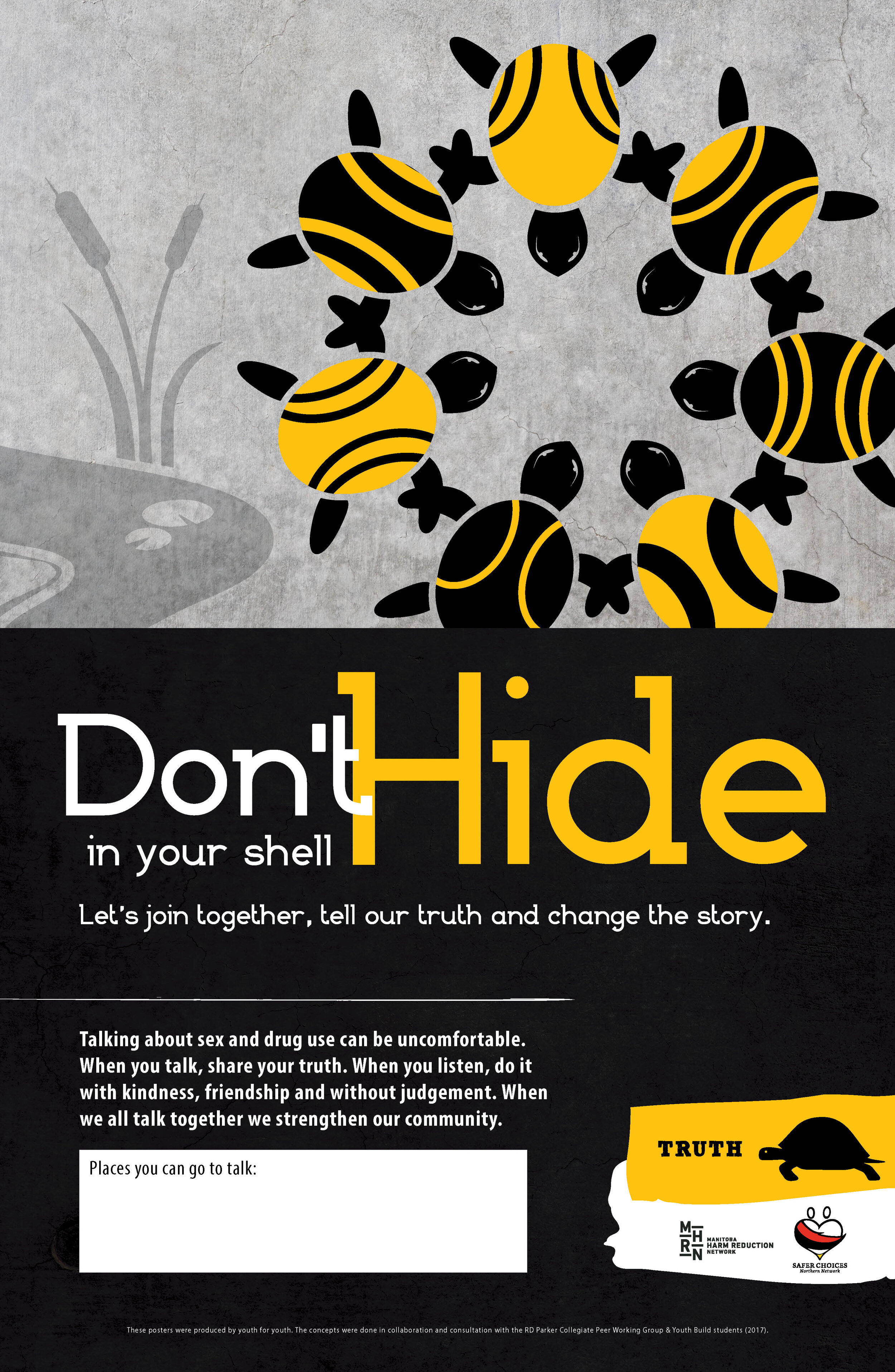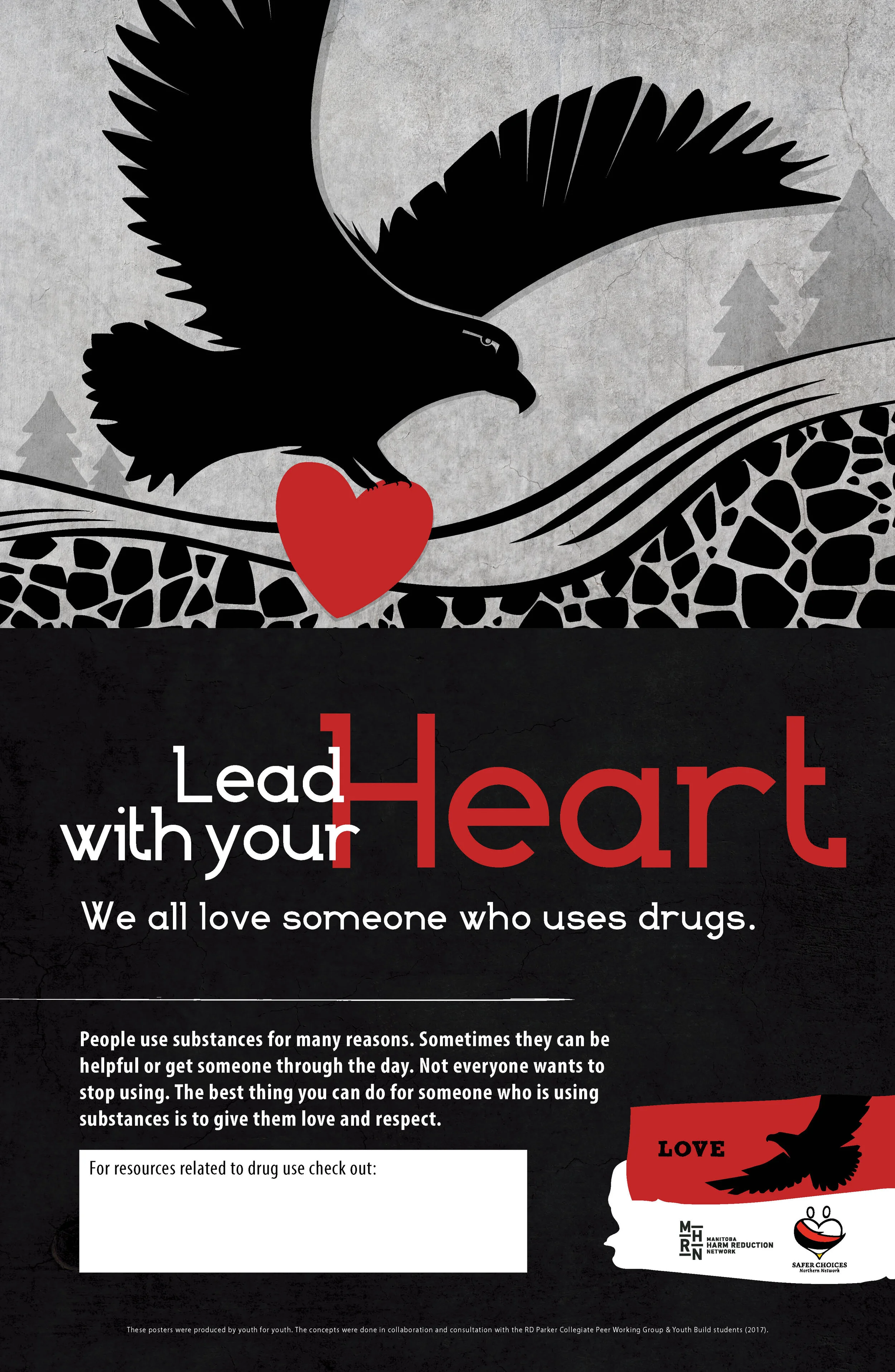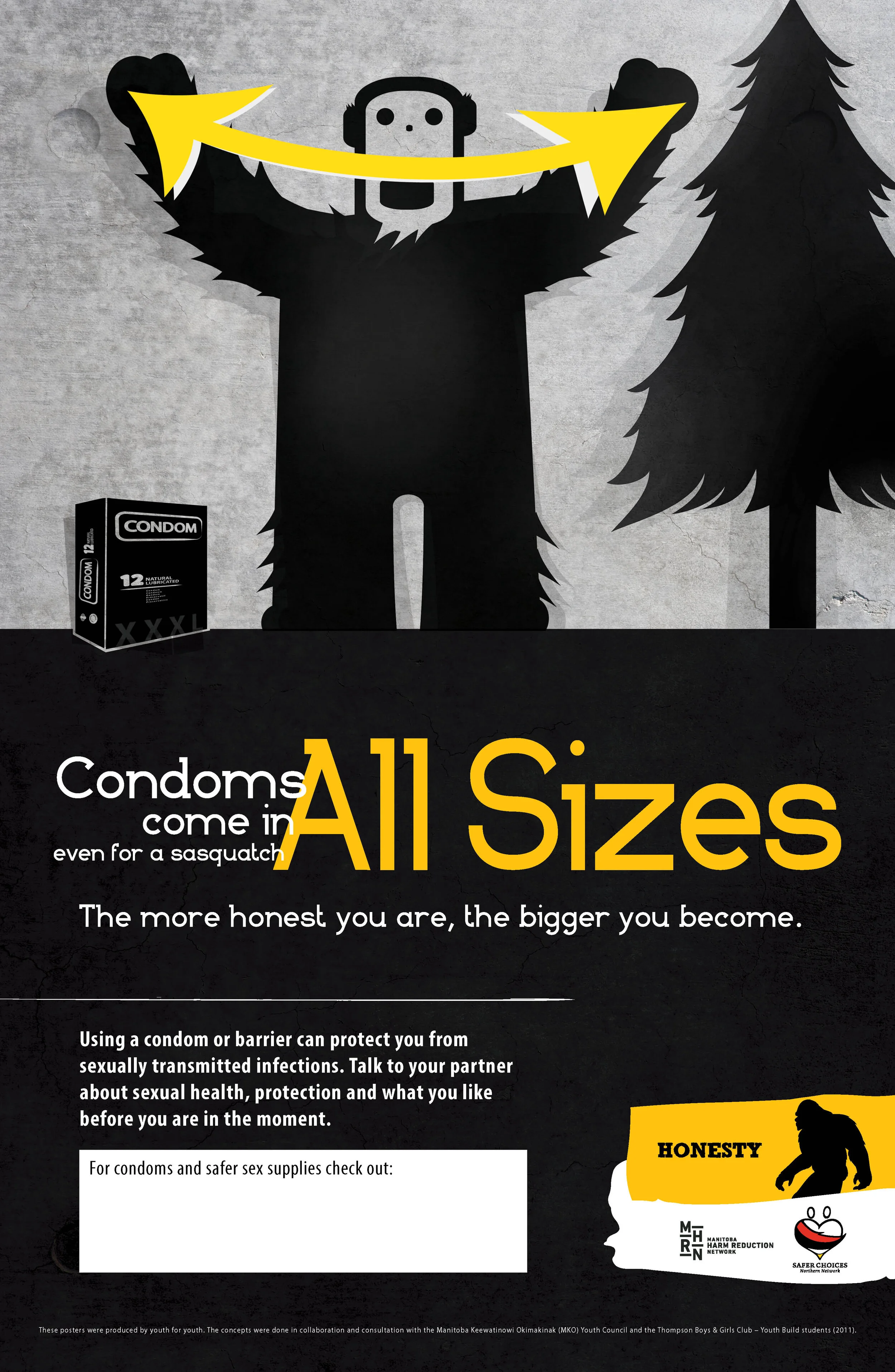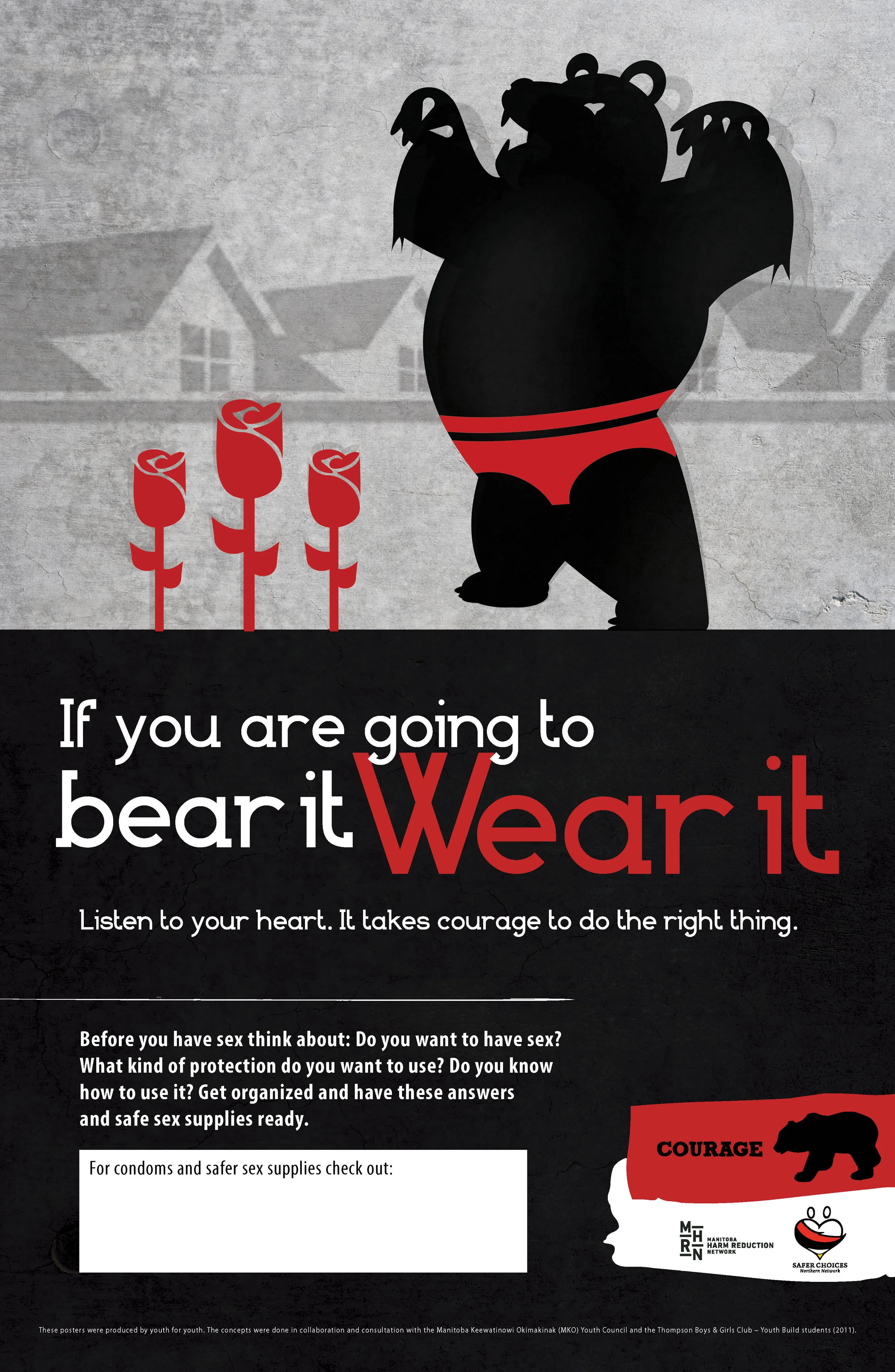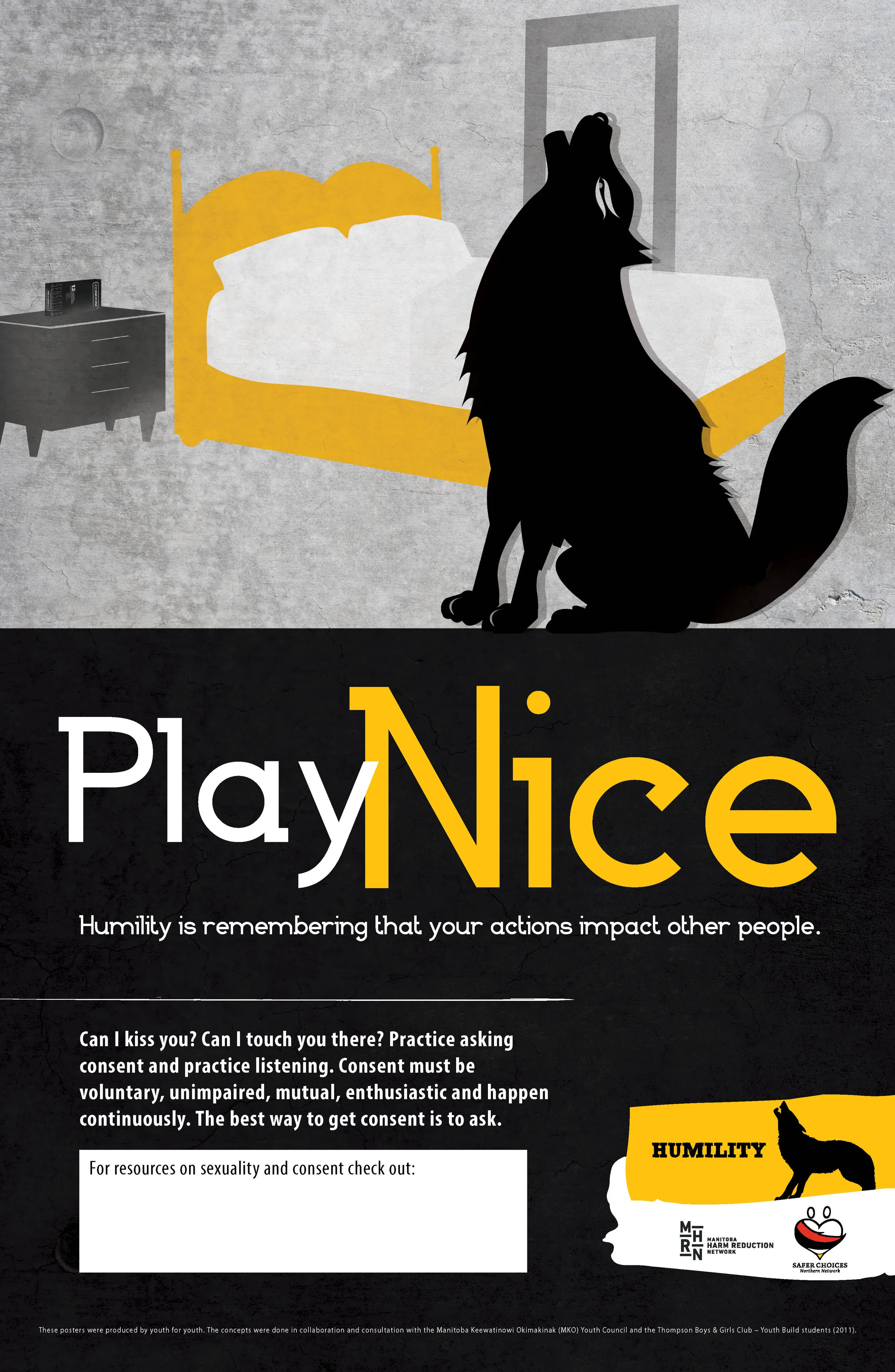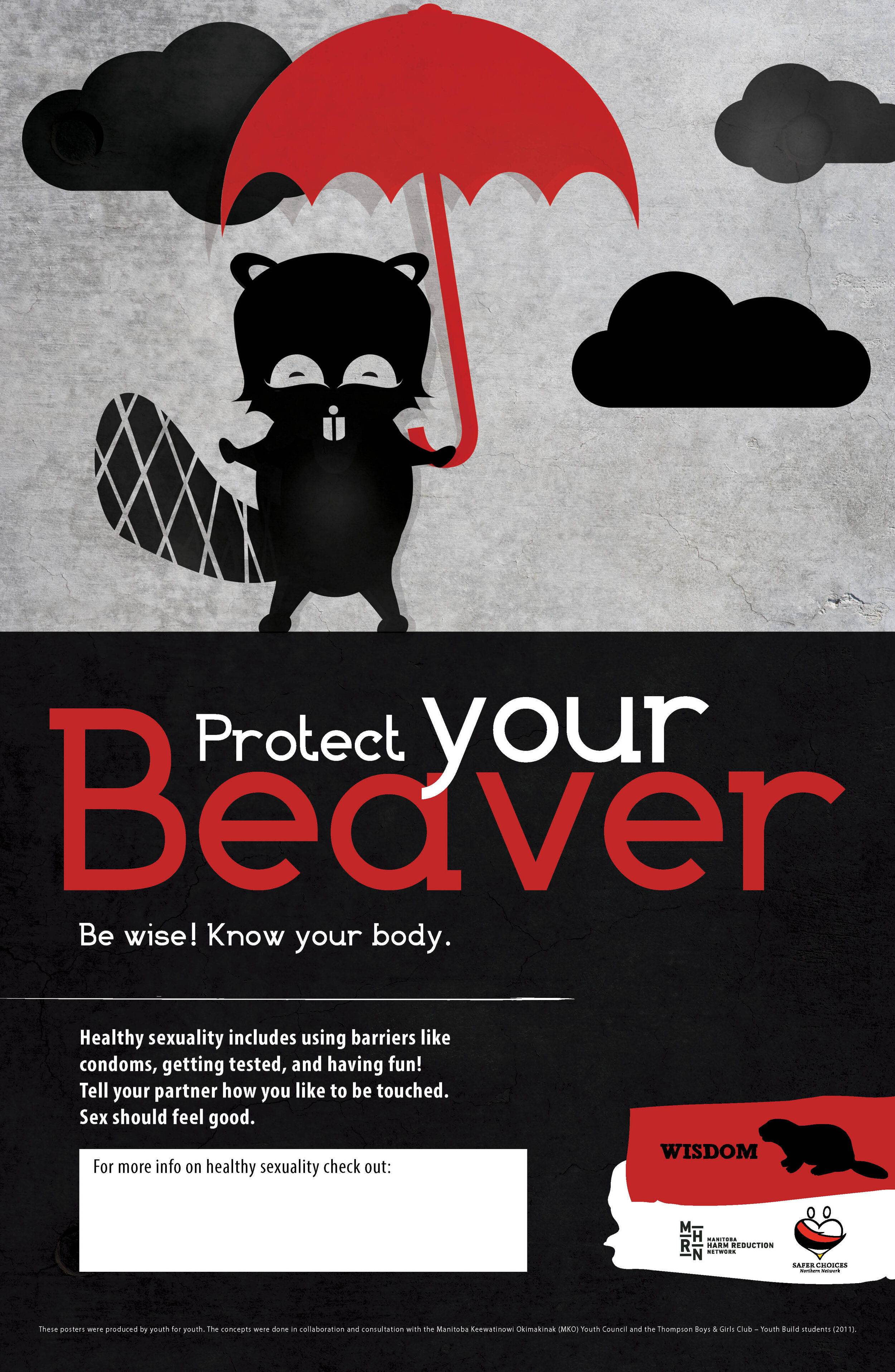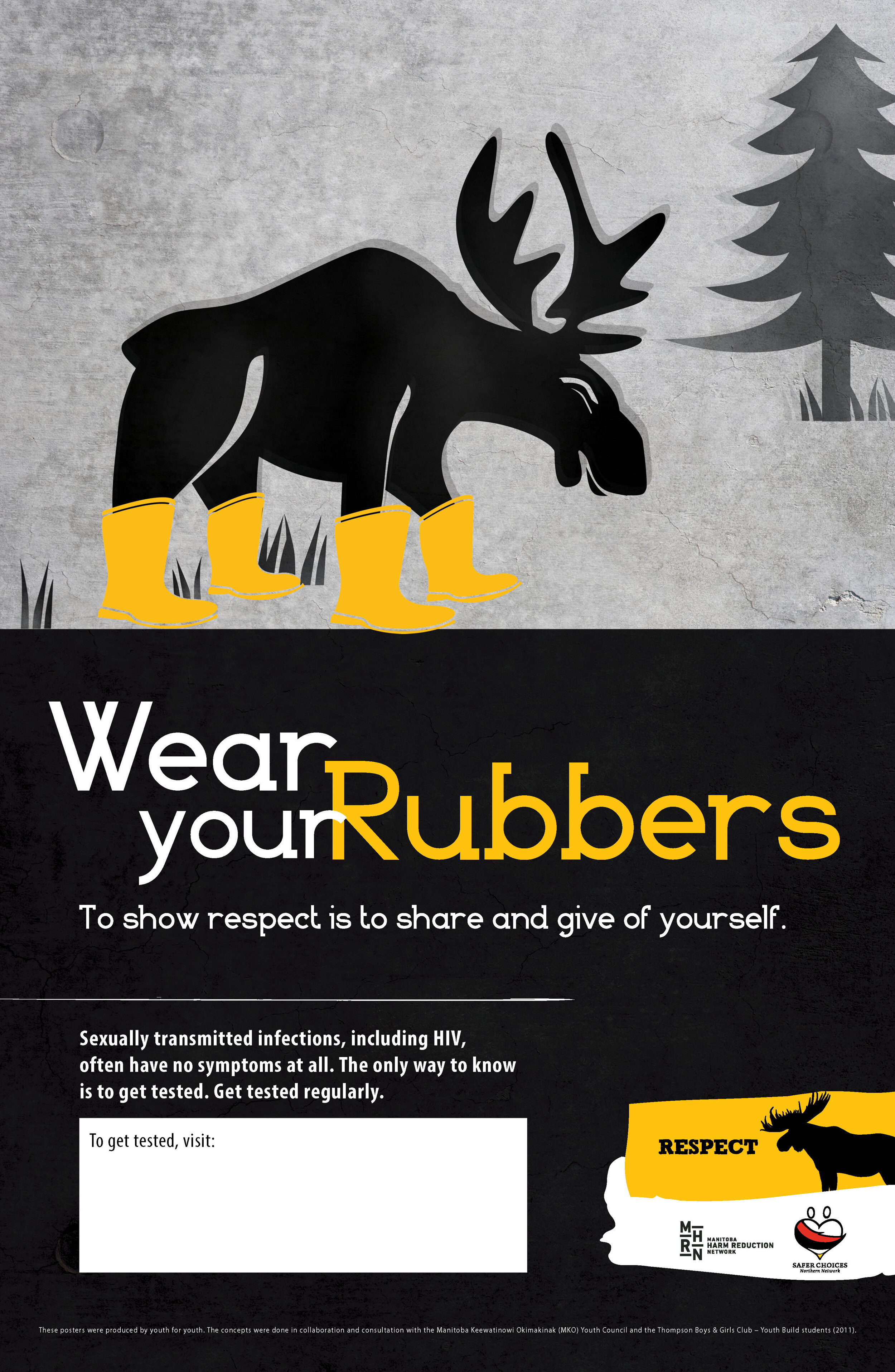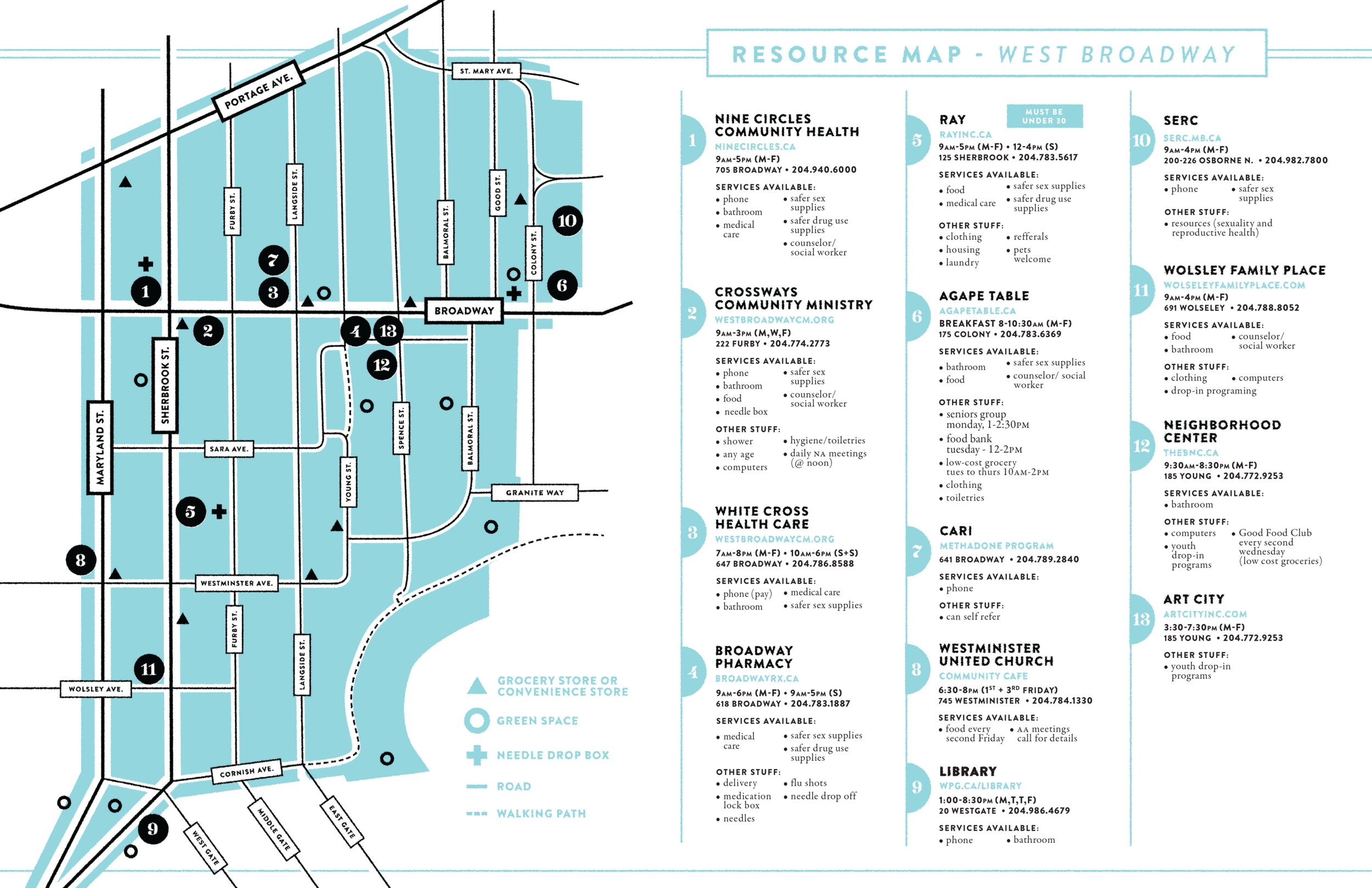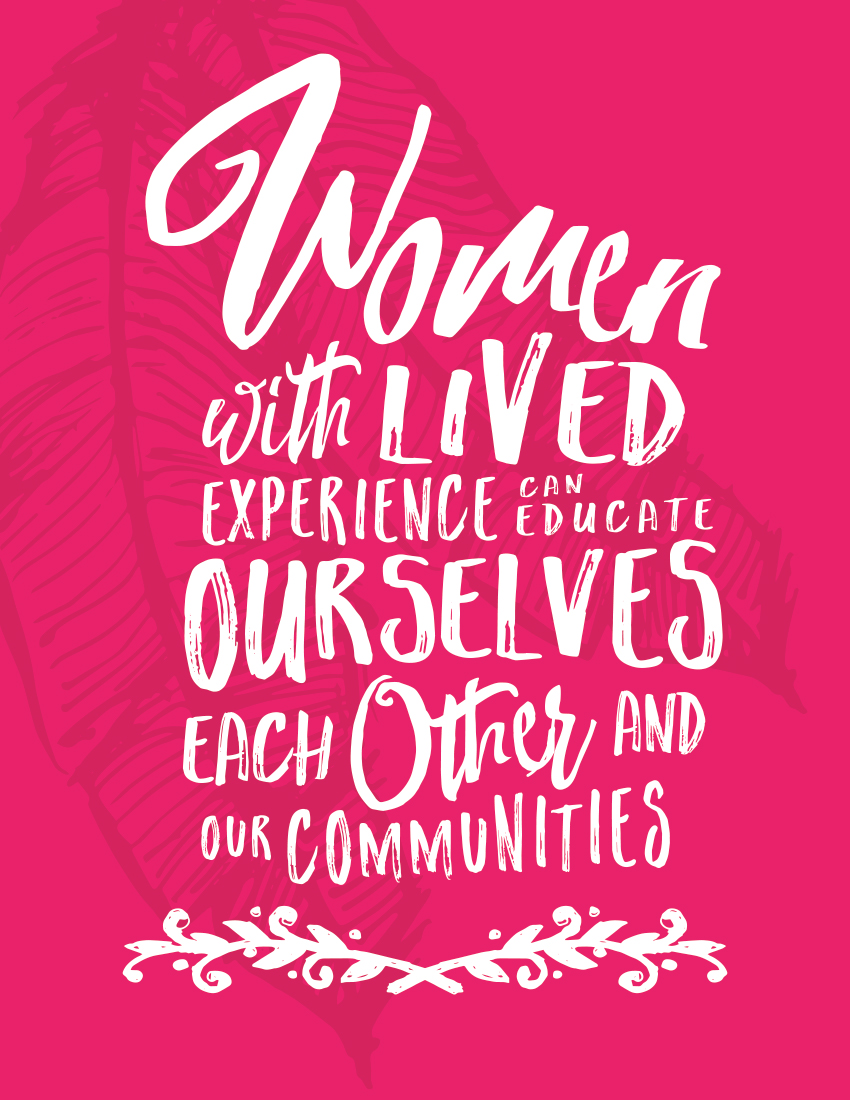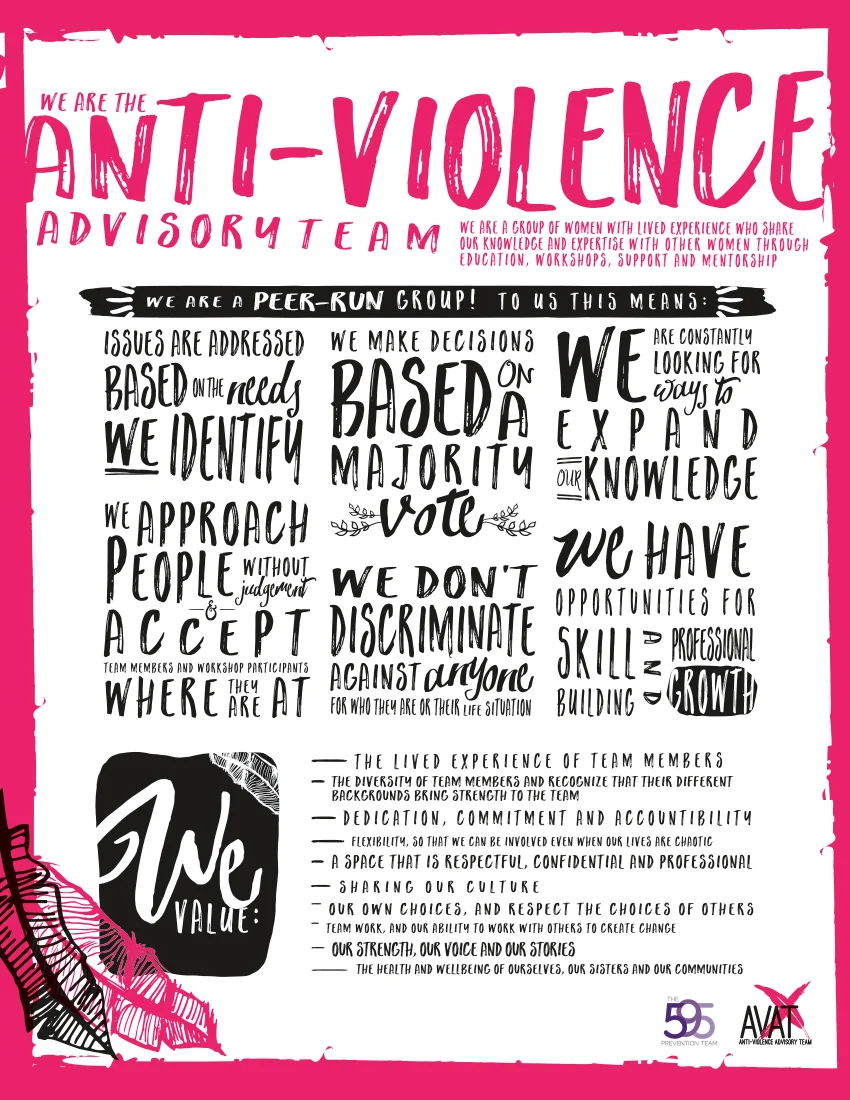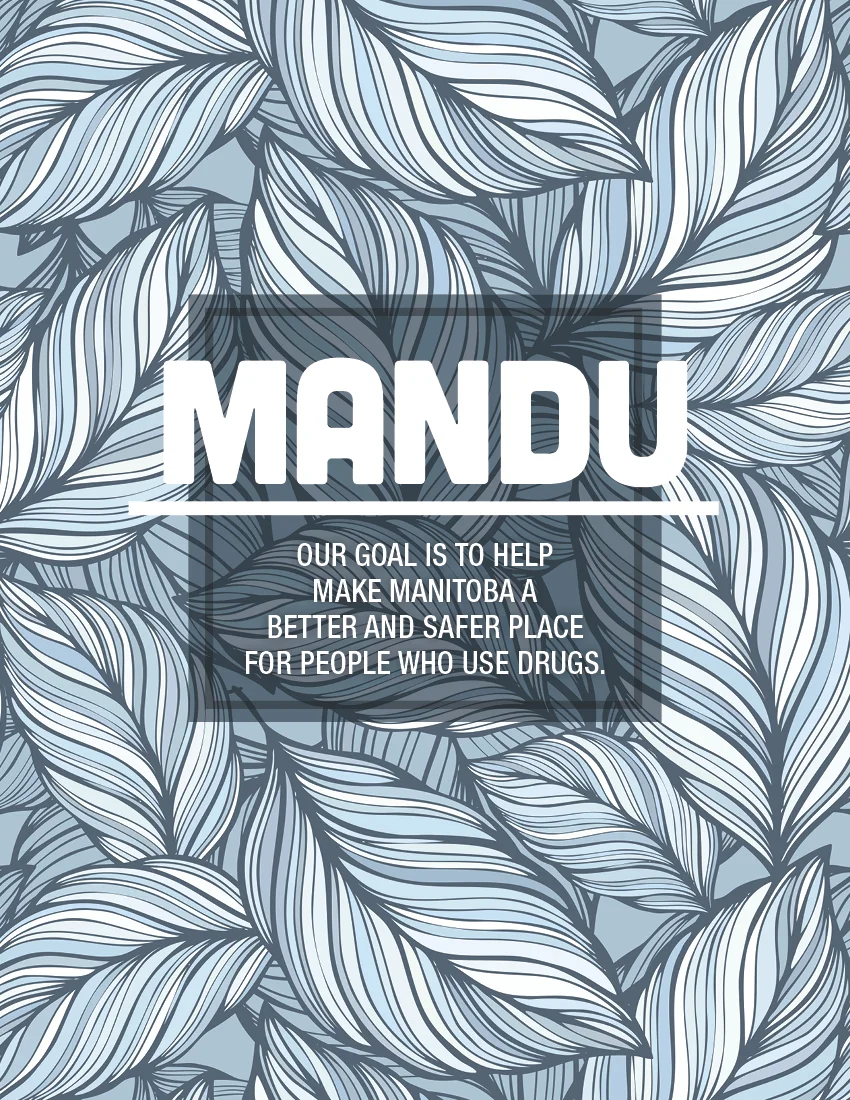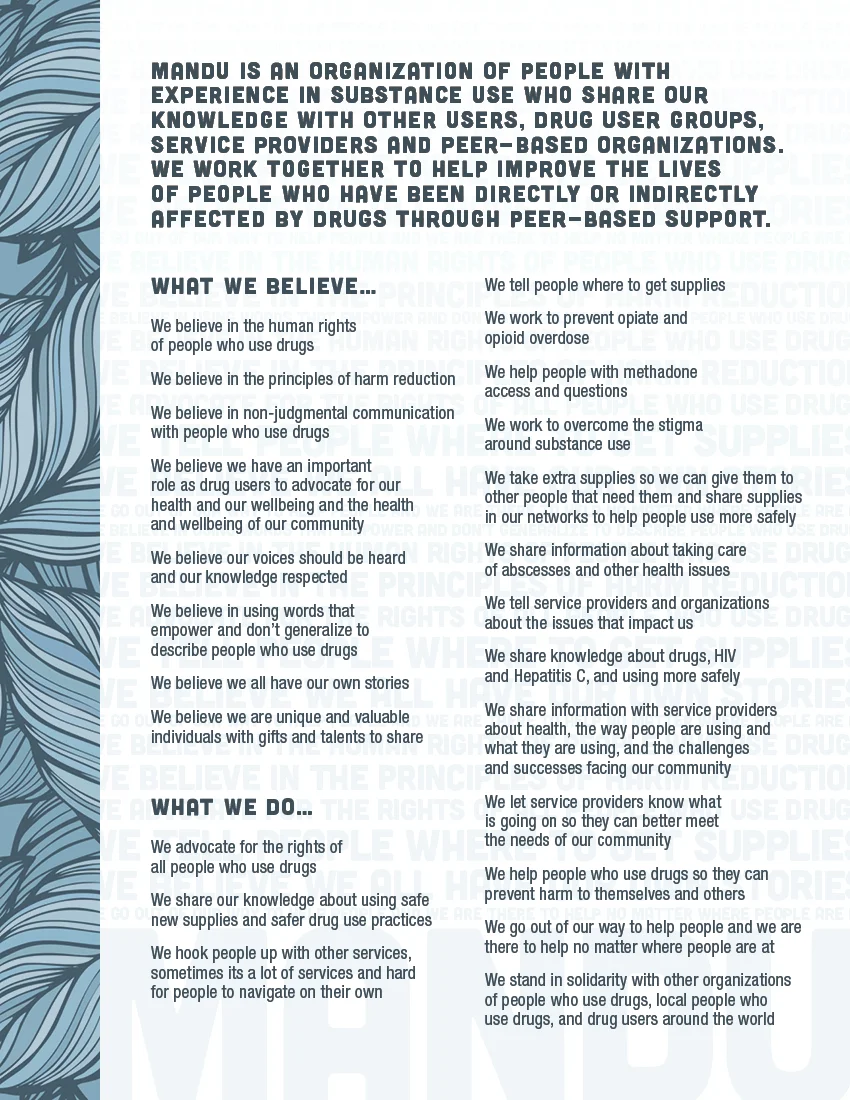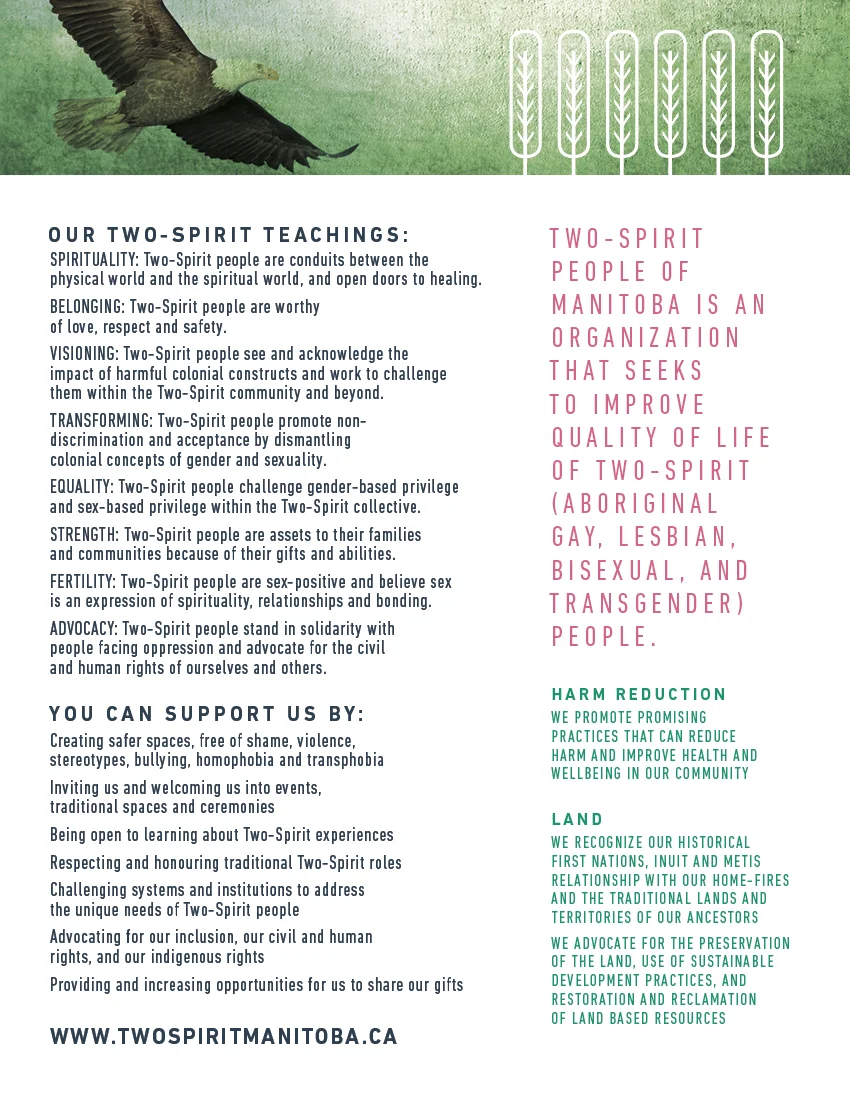Peer-based organizations are a driving force of harm reduction access, social change and community wellness. Peer based organizations are groups of people who use drugs and are impacted by the social determinants of health who are working to create change in their communities. There are 11 provincial peer-based organizations (sometimes called advisory councils) that guide the work of the MHRN in different regions. The MHRN supports peer-based organizations in the work that they do to help their communities be safer by supporting peer-led projects. Some of our recent projects are below:
DIY Care! Zine
The world freaking goes 'round because of the beauty, wisdom and care of people who use drugs. The DIY Care! How people who use drugs take care of each other zine is a passion project of nine Satellite Site Operators in Manitoba!
Read the zine online or print your own copies. Limited printed copies will be available at each of our local sites as well.
> Read the zine online
> Print your own copy (PDF with printer spreads)
Print on 8.5x11 (letter) paper, actual size, print on both sides, flip on short edge. Fold down the middle and staple if desired. All of the pages should be in the correct reading order once folded.
peers in the park, Brandon,MB
This Harm Reduction Project that was done in Brandon with the Peer Advisory Council and Public Health, with funding from CRISM.
For 10 weeks we ran “Peers in the Park” sessions where every Friday peers shared education on harm reduction and STBBIs with other peers. Sessions ended with a meal and discussion. Peer to peer supply distribution of harm reduction supplies was also done at each session, and then throughout the week through outreach.
> Download the report here
> Click the image or this link for the Zine
Harm Reduction Report Card
In Fall 2022, the Manitoba Harm Reduction Network partnered with the Canadian Drug Policy Coalition to host community dialogues across Manitoba as a part of their Getting to Tomorrow project. These dialogues centred the voices of people who use drugs and brought together a range of stakeholders to better understand and implement the changes needed to address the overdose crisis in Manitoba's communities.
Participants discussed a variety of harm reduction measures as well as the barriers their unique communities faced to implementing them. An assessment of these measures is outlined in this document, with a particular focus on the Province of Manitoba’s responsiveness in the face of an increasingly toxic drug supply and environments of hostility toward communities of people who use drugs. Check out the full report for a run down of where things are at in Manitoba!
> Click Here for the Full Report
Addendum:
This report was written in the autumn of 2022. Every effort was made to include, source and reference accurate information. Information was gathered both through research and through peer and community member reports and lived experience. Some information has since changed or found to be incorrect. We would like to issue the following corrections/updates:
MSP Withdrawal Management Services (WMS) no longer has a waitlist as of January 2023 and only had a waitlist due to pandemic numbers restricting the number of beds that could operate with physical distancing.
MSP has developed policy to include: more provision of resources for participants leaving and completing the program; to ensure harm reduction education and supports are part of the Withdrawal process; and MSP will also be initiating greater outreach in an effort to extend support beyond leaving/completing the program.
MSP is currently doing evaluations to be more inclusive in WMS spaces and make the spaces safer and more accessible for LGBTQ2SIA* individuals.
Getting to Tomorrow Colouring Book + Activities
As part of the Getting To Tomorrow project that the MHRN collaborated on with the Canadian Drug Policy Coalition, we produced an activity and colouring book to work with while attending.
By clicking on the image or the link below you can download it for your own use.
For use within an organization please leave the first two pages which contain credits for both the activities and images included as part of the workbook.
> click here to download the workbook
Social Media Campaign Posters
By demand, previous MHRN social media campaigns were turned into easy to print black and white posters by volunteer student placement Bailey Pickard!
Feel free to print and use!
>Click to Download the Collection
Peer Voices, 2023
Moving Target Theatre, The Manitoba Harm Reduction Network, filmmaker Julie Epp and People Who Use Drugs in Winnipeg and Selkirk are proud to present Peer Voices!
This is an open ended video project facilitated by Daniel Thau-Eleff and led by people who use drugs to create something that represents their experiences, and tells a little bit about who they are and what they do as community activists.
It's our hope that the video is widely shared as a learning experience and a way to start conversations about stigma, hope and the work done by people who use drugs to keep our communities safe.
With the generous support of the Manitoba Arts Council / Conseil des arts du Manitoba and the The Winnipeg Foundation.
Feel free to use the reflection questions below as conversation starter for capacity building, at a staff meeting or even with friends and family!
> Click Here For Discussion Questions
> Click here (or the image) for the video
Satellite Sites, 2022-23
This year the MHRN supported 9 peer-led Satellite Distribution Sites across Manitoba! You can read more about it here:
> Click to Download the PDF
peer zine, 2021
This Zine was created in the Fall of 2021 on the territories of the Anishinaabe, Ininew, Anish-Ininew, Dene, and Dakota lands and on the homeland of the Metis Nation. People who used drugs were asked to create work around the core question “what does drug use look like in your community?” The collective results are documented in this edition and they are stunning!
> click to download the pdf
evaluation of mhrn services in the context of the covid-19 pandemic, 2022
National Collaborating Center for Infectious Diseases Evaluation of Manitoba Harm Reduction Network Services in the Context of the COVID-19 Pandemic
The National Collaborating Centre for Infectious Diseases (NCCID) and MHRN worked together to conduct an internal evaluation of services. The aim of this evaluation was to determine the impact of the pandemic on harm reduction services in Manitoba and identify best practices for harm reduction providers. Read the full report here:
> click to download the report
find a needle: pick it up, 2021
The MHRN and WPG Peer Working Group present "if you find a needle, pick it up" a poster about how to safely pick up a needle. Please print or distribute as needed!
> click to download the pdf
pop up ops/scs, 2021
As a response to skyrocketing overdose death rates and a naloxone shortage, the Winnipeg Harm Reduction Network constructed a pop up overdose prevention site (OPS), just off Main St. and Higgins Ave., in Winnipeg MB. This was the first time this type of action occurred in Winnipeg - click the image for more details
> click to download the report
> Click here to Watch a Video Celebrating Jessica Pelletier and her advocacy
Pilot project: business naloxone distribution, 2021
Peers in Selkirk Mb have successfully lobbied to get businesses in their region to carry naloxone to expand access to 24/7. This report provides info and resources about this process.
> click to download the report
Pilot project: fentanyl checking, 2021
In spring 2021 the MHRN ran a pilot project to assess the use of drug checking strips by peer advisory council members. The drug checking strips had high uptake and 3/4 people with results positive for fentanyl said they would change their use based on the results.
> click to download the report
Selkirk harm reduction map project, 2021
Members of the Selkirk Peer Advisory Council created this map in February 2021 to identify places people who use drugs (PWUD) and/or those that care for them can access free and no hassle harm reduction, safer sex, and overdose prevention supplies in Selkirk, MB.
> click to download the map
#smokedontpoke - Meth Pipe Distribution Pilot Project, 2021
This project evaluated the impact of increasing access to meth pipes for Peer Advisory Council members in Winnipeg, Selkirk and Pine Falls.
> click to download the report
> click to download the infographics
Community Urinalysis and Self Report Project: Manitoba Site, 2021
This research project investigated substance use patterns and drug contamination in Winnipeg, Flin Flon and Swan River using a survey and comprehensive urinalysis.
> click to download the report
> click to download the infographics
i love someone who uses drugs because: end the stigma poster campaign, 2021
The peers created these posters as a way to get their voices heard in the community. The hope is that these posters will bring some awareness and will help to reduce stigma in our community. We hope that people will participate by putting up these posters and filling in the blank on the "I heart" posters to share the reasons why they love someone who uses drugs.
> click to download peer statement poster
> click to download i love someone who uses drugs because poster
REMOTE CONTROL: IMPLEMENTING COMMUNITY BASED HIV/ AIDS RESEARCH IN RURAL, REMOTE, AND/ OR NORTHERN MB, 2020
Peer Research Teams from Flin Flon, Wuskwi Sipihk First Nation, and Selkirk have been exploring the role of Peers and how those most impacted by HIV/AIDS create support and community that motivates them to remain in their community. This project centres the voices of rural Peers and those most impacted by the war on drugs as the Researchers. These three teams have built their skills around community based research and HIV/AIDS, talking about how to create safety and connection for those most impacted, and developed and implemented Peer Researcher-directed projects to help build support for those most impacted by HIV, allowing them to remain in and thrive in their communities.
> click to download report
overdose awareness day workshop planning kit, 2020
For Overdose Awareness Day 2020 MHRN designed this workshop planning kit to facilitate outdoor naloxone training, in response to the COVID-19 pandemic and the increase in overdose that it has caused. This kit can be used to plan a standalone event, or an activity at a larger event. Both the floor cards AND speaking notes included in the planning kit are necessary for facilitation.
A limited number of printed floor cards are available for distribution. Contact us if you would like a set!
> click to download floor cards
> click to download Speaking notes
stop, before you call the cops!, 2020
The Winnipeg Peer Working Group, in collaboration with the MHRN and Bar None, is pleased to present this poster on alternatives to calling the police on someone who is high. Folks who use drugs say that criminalization harms them more than drugs themselves do! Please circulate widely, post up in your workspaces and consider all the ways we can show up for people who use drugs in our own communities. If you would like to read more about alternatives to criminalization, check out the Canadian Drug Policy Coalition: https://www.drugpolicy.ca/our-work/case-for-reform/
> click to download
How to talk about people who use drugs & a checklist for a stigma free media, 2020
The Winnipeg Peer Working Group, an advisory council of the MHRN worked on research with the CCPA for the State of The Inner City Report, about how people who use drugs are portrayed in the media. It can be found here: https://www.policyalternatives.ca/offices/manitoba/events/state-inner-city-report-2019. Based on this research they went on to create a guide for the media about reporting on People Who Use Drugs and launched it at a community event.
> click to download version 1
> click to download version 2
Selkirk Drug Checking Pilot, 2019
In 2019 the MHRN supported the Peer Advisory Council in Selkirk in learning to use Drug Checking Reagents. There was low uptake from the group who suggested having staff available to test, focus on fentanyl strips and looking into more accessible drug checking technologies as next steps.
> click to download
Manitoba-Wide Peer Consultation: supplies and safer consumption, 2019
In the summer of 2019 Peer Advisory Councils at five Manitoba Harm Reduction Network Sites completed a brief consultation on the supply and safer consumption needs of people who use drugs (PWUD). The results are compiled here:
> click to download
Tired of seeing needles in the community? so are we!, 2019
The Winnipeg Peer Working Group noticed how people who use drugs were being stigmatized by the needle litter being found in the community. They created a list of peer and evidence informed solutions and shared it in social and community networks.
> click to download
STanding in a field naked -Festival report, 2020
The MHRN conducted an anonymous survey of people who use drugs at Manitoba festivals to make a peer informed list of safety recommendations following the principles of "Nothing About Us, Without Us". These recommendations were circulated to festivals and harm reduction partners who are working to implement these measures.
>Download the guide
>Download the Report
Animal instincts campaign for sexual and reproductive health awareness week, 2020
Based on the Seven Sacred Teachings, this campaign brings sexual health and harm reduction messages to youth.
Safer Choices Northern Network in Thompson developed this campaign for youth in collaboration with The Manitoba Keewatinowi Okimakinak Youth Council, The Thompson Boys & Girls Club Youth Build students, and RDPC PWG students, with support from the NHR and WRHA.
> click to download set of 7
> click to download covid-19 poster
syphilis kitchen table discussion guide, 2020
A kitchen table discussion is a small, informal meeting. Kitchen table discussion groups are often used in conjunction with other methods as part of a wider community engagement process. In this case, a kitchen table is being used to demonstrate and model the casual sharing of STBBI information, specifically Syphilis. Use the guiding questions to start a conversation about Syphilis.
* Not comfortable facilitating this discussion alone, contact your local regional health authority or tribal health centre, a nurse would be happy to come along.
> click to download poster
> click to download discussion guide
> Click to Download the Business Card Sized Info Sheet
hiv/AIds campaign for world aids day/indigenous aids awareness week, 2019
December 1st is World AIDS day and the start of Indigenous AIDS Awareness Week! In respect to these important dates we are launching the poster series that was created during the Remote Control Research Project (Flin Flon Site). This poster series was imagined and created by the Thunder Bear Walkers of Flin Flon, Manitoba.
From the Thunder Bear Walkers:
"We are one of the Manitoba Harm Reduction Networks Peer Research Teams engaged in community based research exploring what life is like for people impacted by HIV/AIDS in rural, remote and northern communities in Manitoba. We used our teachings, knowledge, and ceremony to shape and inform our research process. With our Elders, Knowledge Keepers, and community we thought about how our teachings create meaning for us as peers living in the North. These posters are how we are sharing our work.”
>Click to download
Application + Action
trc READING GUIDE for NON-INDIGENOUS ORGANIZATIONs, 2018
It is critical to recognize that while the TRC mandate related exclusively to the Residential School System, the Colonial Projects executed an intentional genocidal strategy intended to dominate and control the land and exploit its resources.
Use this kit as a guide for your organization to read and apply the TRC report. This toolkit will be most helpful for organizations that have already begun the work of decolonization, and understand some of the concepts contained in the guide. A clear understanding of social justice, the social determinants of health, systemic discrimination and anti-oppression will be necessary to fully engage with the content.
>Download the guide
REmote control
Community-Based Research, 2014
On June 18 and 19 of 2015, the event Remote Control: Building on Capacity to Implement Community-Based Research in Rural, Northern, and Remote Communities in Manitoba took place in Winnipeg, Manitoba. The intention of this event was to engage in dialogue with three communities in Northern and rural Manitoba, Thompson, Flin Flon, and Swan River, to build the foundations of a community-based research (CBR) initiative. The event was meant as a first step to engage in dialogue with these communities, to introduce key stakeholders to the concept and complexity of CBR and to allow them to network and create relationships with one another and with other community members health professionals, researchers and advocates, to discuss HIV/AIDS related issues and priorities in their communities, and to develop a plan to implement a CBR project in each respective community through a collaborative grant proposal development process.
>Click here to see more
What goes around
Community-Based Research, 2014
The 595, formerly the Manitoba Harm Reduction Network, is a network of over 100 member organizations interested in preventing the transmission of HIV, HCV and STIs in Manitoba (Sexually Transmitted and Blood Borne Infections: STBBI).
The 595 Peer Working Group (595PWG) is
made up of 20 peers. This group is involved in discussing ideas about harm reduction and informing programs on best practices. The 595PWG believes that using a harm reduction approach is the best way to support underserved populations and reduce STBBIs in Manitoba.
>Click here to see more
>Published in the Harm Reduction Journal
I Heart someone who uses drugs
We ALL love someone who uses drugs. In 2017 The MHRN launched the I (heart) Someone Who Uses Drugs Campaign. This campaign was aimed at reducing the stigma associated with people who use drugs and was integrated into our training materials, events, and organizational messaging. The idea is that anyone could wear this t-shirt, because we all love someone who uses drugs. To date, over 500 T-shirts have been distributed to peers, service providers and anyone who loves folks that use drugs! Pins and stickers were also distributed at Overdose Awareness Day, Substance Use Awareness Week, and through our network partners ant their events. If you are interested in purchasing t-shirts for an event, or picking up pins and stickers get in touch with the coordinator in your area to see if we have any available.
We Love You, Be Safe.
Peer Project, 2017
In preparation for a spring and summer full of new visitors, the Peer Working Group, a Winnipeg-based advisory council of people who use drugs, decided that they wanted to share information about the neighbourhood they call home. Specifically, information that could help other people impacted by substance use to be safer, more connected, and to raise awareness about current resources. With support from the Manitoba Harm Reduction Network (MHRN), the Peer Working Group completed the project “We Love You, Be Safe: A Harm Reduction Map of West Broadway”.
>Click Here to see the map
>Click here to see the full report
Making a Manifesto
Peer Project, 2016-2017
Supporting the Work of Peer-Based Organizations
Peers identified that they wanted to develop documentation about their work, values, and how service organizations can meaningfully engage them. For this project the Manitoba Harm Reduction Network and several peer-based organizations set to work creating visioning manifestos, and researching how that process impacted their organizations. Peers found it helped them and their organizations in several ways including decreasing stigma and as a tool to guide their work.
>Click here to view the toolkit
>Click here to see the full report
Routine Practices at Indigenous Healing Ceremonies
This resource was developed In partnership with the Spruce Woods Sundance Family and Ka Ni Kanichihk, and the Manitoba Harm Reduction Network. The leaders and helpers at ceremonies, like the Sundance, have created this brochure to inform healers, helpers, dancers, and those who participate in healing ceremonies.
